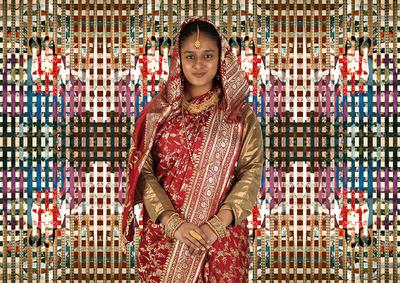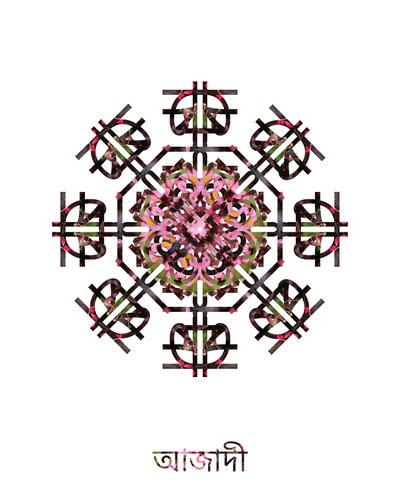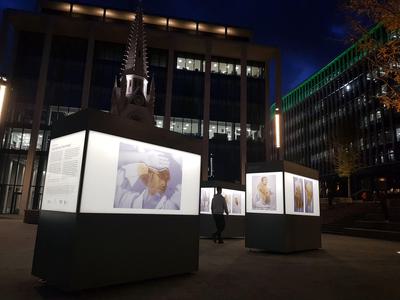News Story
*Trigger Warning - Rape, Genocide, Violence, Sexual Abuse*
In an ever-changing, evolving and growing society, looking back is as important as working towards a better tomorrow. As we mark the year of the 50th anniversary of the independence of Bangladesh, remembering everything that has brought us here acts as a mark of honouring its history. The impacts this fight for independence has had, commemorates not just the celebratory aftermath but the horrors that lead on from it.
Birmingham Museums Trust paired up with the Dhaka-based Bengal Foundation to bring together a set of events, which included film screenings, panel talks and an exhibition, to an audience who may otherwise not be aware or have access to. I for one had viewed Under Construction by Rubaiyat Hossain a few years ago through some research on a project I was working on, but it was great to have the film readily available to view for free. The programme acts an opportunity to explore and educate the stories of many Bangladeshi’s, especially those like my parents and grandparents, who have migrated to and made Birmingham their home.
From two of the screenings, Hossain’s’ Under Construction 2015, tells the story of Roya, a theatre actress stuck between urban Bangladesh and the need to reclaim her identity and sexuality. The film shows Roya reconstructing Rabindranath Tagore’s play Roktokorobi (Red Orleans) in relation to modern times, whilst also relearning who she is in a world that is often found telling her how she should be. Alongside Jothorleena by Dilara Begum Jolly, depicts the life of Roma Chowdhury a birangana (war heroine from the liberation war) who like many women was raped by the Pakistani army during the war. Roma played the face of consequences from post war society and the everlasting trauma left on the female body. The destructions left and the spirit of the war became at one with the role of Roma, felt by many to come.
Both of these films represent the role of woman and their rights since liberation in 1971.
I was fortunate enough to be a part of one of the two panel talks, which I shared with Rubaiyat Hossain and Dina Siddiqui. It was chaired by Lotte Hoek and facilitated conversations around identity, our roles and opinions as Bangladeshi women and what collectively our practises have to offer in understanding how women are represented. For me, allowing a safe space to have these conversations only goes to show the way we uplift one another to learn from the experiences of those before us. The changing face of women’s work, especially in Bangladesh, allows a further comment in how the country has developed from the initially stories that Roya and Roma dealt with.

As a fine artist, my work is often delving into the place of women in contemporary society. I believe Art can hold the power to centrally concern itself into the way women’s identities have evolved and, in some ways, provoke that possibility of change and transform. The power of language is one that I hold close to me because I have read the terrors of war that followed in fighting for the choice, to be able to speak Bangla. You’ll often see I implement Bangla into my work in any way I can, for me, if you don’t like or take nothing from the work I make - I want you to take away a piece of my language. A piece of my Bangla. The power of language and words live on, 50 years from, as an act of how liberation lives on. I learnt to talk Bangla living in an extended family as the third generation. It’s the way I stayed connected to my grandparents and even my mother whose mother tongue was Bangla. Learning to read and write came by chance, my mosque teacher who taught me how to read the Quran was Bengali and he insisted on learning our mother tongue. He taught me to read and write Bangla, and I have been doing it since.

The second panel featured the filmmaker Dilara Begum Joly herself, alongside, Leesa Gazi, Catherine Masud and chaired by Nobonita Chowdhury. The panellists go on to discuss the roles of women and how they have adapted and evolved over time. Seeing survivors of war as victims, especially when they are women, is something seen all over the world and not just specific to Bangladesh. Conversations around resilience and the importance strength played in sticking to their beliefs, even when the world around them constantly tried to change their narrative for them. Inherent hatred and shame of patriarchy are things women carry in their bodies, the livid stories of everyday life and not specific to war crimes. Including many discussions around the way slurs from society frame discussions of war crimes by victimising and not looking at the perpetrators. This should be central to discussions if we want an evident change.
As an artist and photography lecturer, the outdoor exhibition was one of my favourite parts of this partnership project. Lost Memory Eternalised by Mustafa Zaman is an outdoor exhibition exploring and representing historically found images which unearth the untold story of the past. Human conditions that are altered by history, becomes the evident hand in these images that are overlayed with honey. Honey acts as a transcendence inherent in these images, forcing you to sense the loss and timelessness they behold. Zaman accompanies the pieces with his own written poetry. The visuals present a metaphor into the impacts of politics and history accompanied by a sense of loss shown through the residue left by the honey. A renewed vision is lightly enforced in these images by inviting in the viewer to look beyond the aesthetic value and into a larger collective history. Having these presented outdoors, allowed the work to be seen by audiences who wouldn’t necessarily walk into the gallery to view them. It brought the work to the people rather than the other way around.

What we are capable of as people, as women, speaks volumes in this fight for resistance that occurred long before I have existed. The stories of Bangladesh talk about its strength and endurance to not only fight but to take on the aftermath of the events that broke the country apart. Building a future while living with the ghosts of the past, the tenacity in seeking refuge in songs and sisterhood and not fearing to speak their minds. Coming together to celebrate these tales validate them as a living proof and allows a sense of recognition for everything that has been lost and nurtured back.
Nilupa Yasmin
Nilupa Yasminis an award winning Artist and Educator and visiting lecturer in Photography at Coventry University. Working primarily lens based, Yasmin takes a keen interest in the notion of culture, self-identity and anthropology. Combined with her love for handcraft and the materiality in photographic explorations, she repeatedly draws upon her own South Asian culture and heritage.
This partnership project was a collaboration between Birmingham Museums Trust and Dhaka-based Bengal Foundation, a leading Bangladeshi arts charity. It was part of a shared artistic programme that marks the 50th anniversary of Bangladesh’s independence and was funded by the British Council. The original development of and collaboration for this project was made possible through Transforming Narratives(TN), a ground-breaking programme to support exchanging contemporary narratives between creative and cultural practitioners and organisations in Birmingham, Pakistan and Bangladesh. TN is supported by Arts Council England and delivered in association with The British Council.
